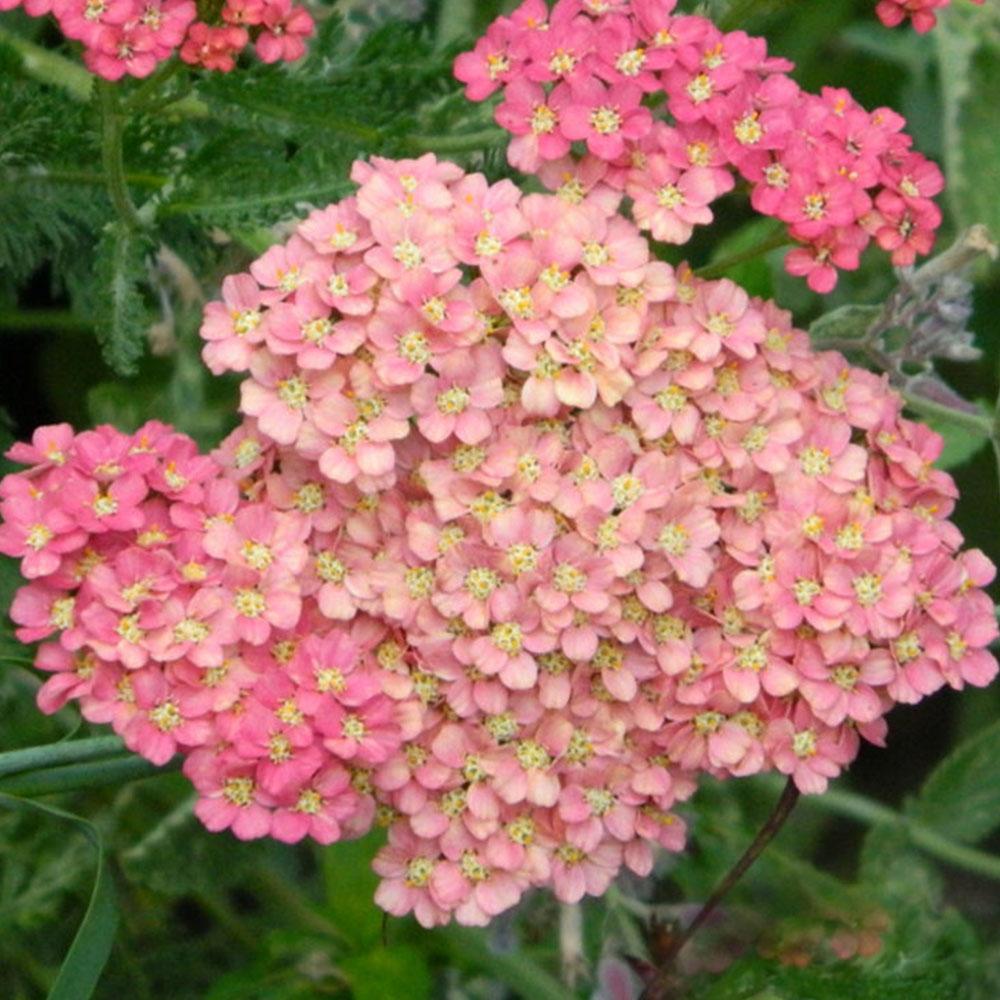No products in the cart.
Achillea millefolium ‘Wesersandstein’
A striking flowering perennial known for its beautiful pink color-shifting flowers and long flowering season.
Rated 0 out of 5
0 customer reviews
€ 4,90
Only 16 item(s) left in stock!
Tags: couleur, evergreen, feuillage persistant, fleurs, graphique, longue floraison, medicinal, perennial, secheresse, vivace
SKU: pda358
Category: Bees and Butterflies, Bouquet, Distillations, Evergreen, Frost Hardy, Ground Cover, Make it Pop, Medicinal, Rewild

Achillea millefolium 'Wesersandstein'
€ 4,90
Only 16 item(s) left in stock!
Achillea millefolium ‘Wesersandstein’ is a striking perennial plant known for its beautiful clusters of color-shifting, pink and cream colored flowers.
The green, finely cut, aromatic foliage forms a compact clump with a light and feathery silhouette, fitting well in more rustic prairie-type settings as well as among more robust and voluminous perennials in a sunny flower bed.
Th flowers of this variety are prized for their long bloom period and interesting changing palette.
From June to October, the flower color will shift from a bright salmon pink to a more muted copper and sand tonality.
Achillea millefolium can be planted in all regions, in sunny, well-drained soil.
Part of the Achillea millefolium (yarrow) family, it is prized for its drought tolerance, low maintenance, and ability to attract pollinators like bees and butterflies.
And it looks amazing in bouquets or dried flower arrangements.
Tips:
Yarrow has a well-developed fibrous root system and prostrate stems that root at the nodes and become far creeping stolons > this means that it can colonize an area quite quickly, creating a beautiful ground cover.
The plant has branched rhizomes that generally remain in the top 10 cm of soil > this allows for it to be tamed if ever the colonization is getting out of hand.
The Tales:
It was named after Achilles who used it to bind the wounds of his men at the Battle of Troy as the leaves have astringent properties.
Yarrow has been found with Neanderthal burials, suggesting its association with human species dates to at least 60,000 years ago
It has been used since ancient times to heal wounds and stop bleeding, and in the sixteenth century the crushed leaves were used to stop nosebleeds.
The Miwok in California used the plant as an analgesic and head cold remedy.
The plant contains a uniquely blue essential oil – today it is used widely for medicinal purposes, for happiness creation, for face masks, for hydration, for chasing away sadness… there is lots of research, just make sure to double check the sources!
Yarrow tea has and can be used as a sedative or relaxant to reduce anxiety and stress – it is a bit bitter though, so it isn’t for everyone 🙂
Origin:
Europe
Similaire
| Weight | 0,2 kg |
|---|---|
| Flower Color | Pink |
| Soil | Rocky, Dry |
| Exposure | Full Sun |
| Frost Tolerance | -25°C |
| Size: | Height – 0.4m/ Spread – 0.6m |
Reviews
0
Rated 0 out of 5
0 customer reviews
5
0
4
0
3
0
2
0
1
0
Only logged in customers who have purchased this product may leave a review.
Related Products
Kalanchoe daigremontiana
A toothy succulent from Madagascar, known as the Mother of Thousands.
A toothy succulent from Madagascar, known as the Mother of Thousands.
Rated 0 out of 5
Delosperma cooperi
A dwarf perennial known for its vermillion colored flowers
A dwarf perennial known for its vermillion colored flowers
Rated 0 out of 5
Cerastium tomentosum var. columnae
A grey-green spreading ground cover from the mountains.
A grey-green spreading ground cover from the mountains.
Rated 0 out of 5
Vinca minor
Looping elegance and ability to form a low flowering ground cover
Looping elegance and ability to form a low flowering ground cover
Rated 0 out of 5
Mentha x piperita ‘Chartreuse’
A spicy mint, known for its use in the production of liqueurs and herbal teas.
A spicy mint, known for its use in the production of liqueurs and herbal teas.
Rated 0 out of 5
Tanacetum densum subsp. amani
A shrublet composed of soft, finely divided silvery gray-white leaves.
A shrublet composed of soft, finely divided silvery gray-white leaves.
Rated 0 out of 5
Melissa officinalis
A perennial plant in the mint family that is adored by bees, royal families and tea drinkers.
A perennial plant in the mint family that is adored by bees, royal families and tea drinkers.
Rated 0 out of 5
Euphorbia myrsinites
Known for its draping form of silver-gray foliage and radiant blooms.
Known for its draping form of silver-gray foliage and radiant blooms.
Rated 0 out of 5
Stachys byzantina
Silky white-grey leaves and tall striking flowers
Silky white-grey leaves and tall striking flowers
Rated 0 out of 5
Euphorbia cyparissias Clarice Howard
A Euphorbia that resembles a soft little cyprus tree
A Euphorbia that resembles a soft little cyprus tree
Rated 0 out of 5
Artemisia ludoviciana ‘Valerie Finnis’
A semi-evergreen, aromatic variation on the theme of Artemisia.
A semi-evergreen, aromatic variation on the theme of Artemisia.
Rated 0 out of 5
Erigeron kavinskianus
A daisy-like carpet of flowers
A daisy-like carpet of flowers
Rated 0 out of 5
Sedum album
A low, multi-color ground cover.
A low, multi-color ground cover.
Rated 0 out of 5
Glechoma hederacea
A sweet smelling ground cover, producing little blue flowers all summer long.
A sweet smelling ground cover, producing little blue flowers all summer long.
Rated 0 out of 5
Hellebore argutifolius
Winter flowering perennial with marbled blue-green leaves
Winter flowering perennial with marbled blue-green leaves
Rated 0 out of 5
Hieracium maculatum ‘Leopard’
A native perennial with blue-green leaves and a tall yellow flower
A native perennial with blue-green leaves and a tall yellow flower
Rated 0 out of 5
Tradescantia andersoniana ‘Blushing Bride’
A Tradescantia with gorgeous blushes of pink and white that appear in the coldest nights.
A Tradescantia with gorgeous blushes of pink and white that appear in the coldest nights.
Rated 0 out of 5
Trachelospermum asiaticum ‘Ogon Nishiki’
Jasmine with colorful foliage and lovely white flowers in summer
Jasmine with colorful foliage and lovely white flowers in summer
Rated 0 out of 5
recent view product
Echinops ritro
Tall, electric blue globe thistles
Tall, electric blue globe thistles
Rated 0 out of 5
Kalanchoe laetivirens (Aranto)
A cultivar with larger all-green leaves and thousands of pups along their broad edges.
A cultivar with larger all-green leaves and thousands of pups along their broad edges.
Rated 0 out of 5
Chrysanthemum ‘Duchess of Edinburgh’
A perennial that produces many burgundy red double flowers
A perennial that produces many burgundy red double flowers
Rated 0 out of 5
Mertensia maritima
A deciduous perennial with fleshy, blue-grey-green leaves that naturally thrives on the wind and sea swept coasts
A deciduous perennial with fleshy, blue-grey-green leaves that naturally thrives on the wind and sea swept coasts
Rated 0 out of 5
Sedum kamtchaticum var floriferum “Weihenstephaner Gold”
Sedum ‘Weihenstephaner Gold’ is a low-growing sedum with a thick, dependable dark-bronze/green foliage and prolific flowering cycle.
Sedum ‘Weihenstephaner Gold’ is a low-growing sedum with a thick, dependable dark-bronze/green foliage and prolific flowering cycle.
Rated 0 out of 5
















































There are no reviews yet.